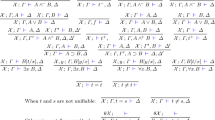Abstract
We study the relations between the expressive power of non-monotonic formalisms and polynomial-time computability in the framework of stable models semantics. While the problem of deciding whether a logic program has a total stable model isNP-complete, we introduce a polynomial-time algorithm that generates such a model for several important classes of programs, that are discussed in this paper. In the general case, the algorithm generates a (not necessarily total)p-stable model of the input program.
Similar content being viewed by others
References
Final Reports of the 1993 Workshop on Logic Programming and Non-Monotonic Reasoning, available from A. Nerode.
S. Abiteboul and V. Vianu, Expressive power of query languages,Theoretical Studies in Computer Science (Academic Press, 1992) 207–251.
K. Apt, H. Blair and A. Walker, Towards a theory of declarative knowledge, in:Foundations of Deductive Databases and Logic Programming, ed. J. Minker (Morgan Kaufmann, Los Altos, CA, 1988) pp. 89–148.
R. Ben-Eliyahu and R. Dechter, Propositional semantics for disjunctive logic programs,Proc. Joint Int. Conf. and Symp. on Logic Programming (1992) pp. 379–385.
R. Ben-Eliyahu and L. Palopoli, Reasoning with minimal models: efficient algorithms and applications,Proc. 4th Int. Conf. on Principles of Knowledge Representation and Reasoning (1994) pp. 39–50.
R. Ben-Eliyahn and L. Palopoli, The expressive power of stratified Datalog over ordered databases, Technical Report R-225, Cognitive System Laboratory, UCLA (1994).
N. Bidoit and C. Froidevaux, General logic databases and programs: default logic semantics and stratification,Information and Computation 19 (1991) 15–54.
M. Cadoli, On the complexity of model finding for nonmonotonic propositional logics,Proc. 4th Italian Conf. on Theor. Comp. Science (World Scientific, 1992) pp. 125–139.
A. Chandra and D. Harel, Structure and complexity of relational queries,J. Comput. Syst. Sci. 25(1) (1982) 99–128.
A. Chandra and D. Harel, Horn clause queries and generalizations,J. Logic Programming 2(1) (1985) 1–15.
Z. Chen and S. Toda, The complexity of selecting maximal solutions,Proc. 8th IEEE Conf. on Structures in Complexity Theory (1993) pp. 313–325.
Garey and Johnson,Computer and Intractability: A Guide to the Theory of NP-Completeness (Freeman, 1979).
M. Gelfond and V. Lifschitz, The stable model semantics for logic programming,Proc. 5th Int. Conf. on Logic Programming (MIT Press, Cambridge, MA, 1988) pp. 1070–1080.
M. Gelfond, H. Przymusinska, V. Lifschitz and M. Truszcynski, Disjunctive defaults,Proc. 2nd Int. Conf. on Principles of Knowledge Representation and Reasoning (1991) pp. 230–237.
F. Giannotti, D. Pedreschi, D. Saccá and C. Zaniolo, Nondeterminism in deductive databases,Proc. 2nd Int. Conf. on Deductive and Object-Oriented Databases (1991).
S. Greco, C. Zaniolo and S. Ganguly, Greedy by choice,Proc. ACM-PODS (1992) pp. 105–113.
N. Immerman, Relational queries computable in polynomial time.Information and Control 68 (1986) 86–104.
P. Kolaitis, The expressive power of stratified logic programs,Information and Computation 90 (1991) 50–66.
K. Kunen, Signed data dependencies in logic programs,J. Logic Programming 7(3) (1989) 231–245.
V. Lifschitz and H. Turner, Splitting a logic program,Proc. ICLP '94 (MIT Press, 1994) pp. 23–37.
J.W. Lloyd,Foundations of Logic Programming (Springer-Verlag, New York, NY, 1987).
W. Marek and M. Truszcynski, Autoepistemic logic,Journal of the ACM 38(3) (1991).
J. Minker, On idenfinite databases and the closed world assumption,LNCS 138 (1982) 292–308.
R.C. Moore, Semantics considerations on non-monotonic logic,Artificial Intelligence 25 (1985) 75–94.
C.H. Papadimitriou, A note on the expressive power of Prolog programs,EATCS Bull. 26 (1985) 21–23.
C.H. Papadimitriou and M. Yannakakis, Tie-breaking semantics and structural totality,Proc. ACM-PODS (1992) pp. 16–22.
T.C. Przymusinski, Extended stable semantics for normal and disjunctive programs,Proc. of the 7th Int. Conf. on Logic Programming (MIT Press, Cambridge, 1990) pp. 459–477.
R. Reiter, A logic for default reasoning,Artificial Intelligence 13(1) (1980) 81–132.
D. Saccá, The expressive power of stable models for Datalog queries with negation,Proc. ILPS '93 Workshop on Structural Complexity and Recursion-theoretic Methods in Logic Programming (1993) pp. 150–162.
D. Saccá and C. Zaniolo, Stable models and non-determinism in logic programs with negation,Proc. ACM-PODS (1990) pp. 205–217.
D. Saccá and C. Zaniolo, Partial models and three-valued models in logic programs with negation,Proc. 1st Int. Conf. on Logic Programs and Non-monotomic Reasoning (MIT Press, 1991) pp. 87–104.
T. Sato, Completed logic programs and their consistency,J. Logic Programming 9(1) (1990) 33–44.
J.S. Schlipf, The expressive powers of logic programming semantics,Proc. ACM-PODS (1990) pp. 196–204.
J.D. Ullman,Principles of Database and Knowledge-Base Systems, Vols. 1 and 2 (Computer Science Press, 1989).
A. Van Gelder, K. Ross and J. Schilpf, The well founded semantics of general logic programs,Journal of the ACM 38(3) (1991) 620–650.
Author information
Authors and Affiliations
Additional information
This work was partially written while the first author was visiting at the UCLA Computer Science Department. The first author has been supported in part by the Consiglio Nazionale delle Ricerche of Italy.
Rights and permissions
About this article
Cite this article
Palopoli, L., Zaniolo, C. Polynomial-time computable stable models. Ann Math Artif Intell 17, 261–290 (1996). https://doi.org/10.1007/BF02127971
Issue Date:
DOI: https://doi.org/10.1007/BF02127971




